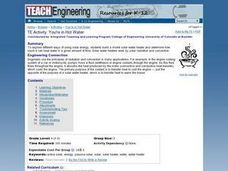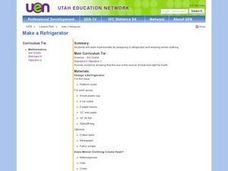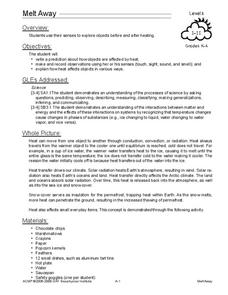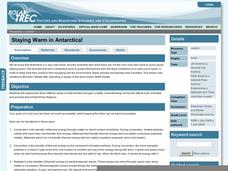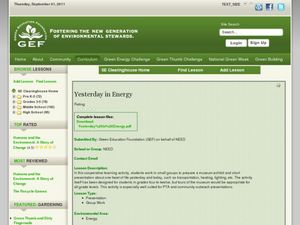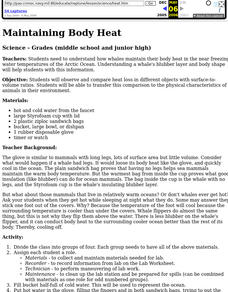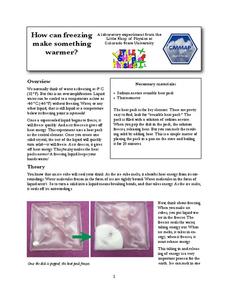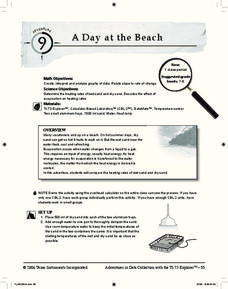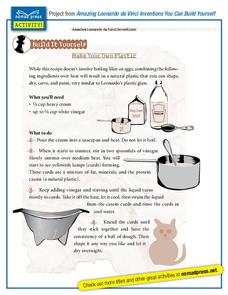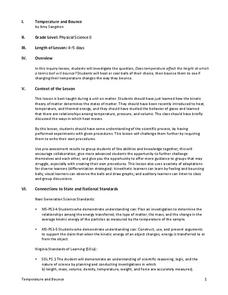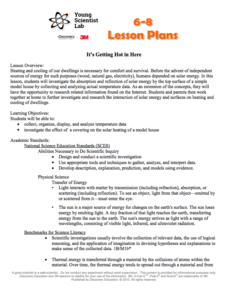Curated OER
TE Activity: You're in Hot Water
Students study different ways of using solar energy. They design a solar water heater and determine how much water it can heat in a set amount of time. They examine how the heaters work by solar radiation and convection.
Curated OER
Make a Refrigerator
Third graders explore the concept of heat transfer as experienced in wearing winter clothing and analyzing the refrigerator.
Curated OER
Melt Away
Students explore objects before and after heating using their senses. In this matter and energy lesson, students experiment with a variety of objects and use their senses (except taste) to make predictions and record observations about...
National Center for Case Study Teaching in Science
A Tale of Two Houses
Does it cost more per year to heat Bill's home in North Dakota or to cool Bubba's home in Georgia? Using heat transfer concepts, mathematical equations, and critical thinking skills, young engineers work in groups to determine who is...
American Chemical Society
Condensation
It's time to break the ice! If you are doing all of the lessons in the unit, children have already seen that increasing heat increases the rate of evaporation, but is the opposite true? Does decreasing temperature cause more condensation...
Teach Engineering
Capturing the Sun's Warmth
Passive solar heating is a technology that's been in use for thousands of years. Here, elementary schoolers are exposed to this type of heating, the materials that are used in passive solar heating, and they study how engineers design...
Polar Trec
Staying Warm in Antarctica!
Has your class ever wondered how animals and scientists stay warm in the Polar Regions? Kids will investigate to understand the three types of heat transfer and how heat transfer affects those trying to stay toasty in sub-zero...
Curated OER
The Big Squeeze
Students observe what happens as crayon shavings are melted and/or pressed together. They compare this to the process some rocks go through as they are heated and compressed naturally on earth.
Curated OER
Yesterday in Energy
Clever! Collaborative groups of environmental scientists create a museum exhibit and presentation for an energy-using activity such as heating a home or transportation. They must compare past to present use of energy for that particular...
Curated OER
Beat the Heat: Meander Through These Books
A hazy, daisy, lazy summer reading list for math (and interdisciplinary) learning.
Curated OER
Solids, Liquids, and Gases
First graders explore the properties of matter. In this states of matter lesson, 1st graders conduct scientific investigations that require them to mix, cool, and heat objects in order to observe changes in the properties of matter.
Curated OER
Sand or Rock? Finding Out From 1,000 km
Young scholars observe how measurements are made with different instruments. In this remote sensing activity students investigate the physical state of surfaces including the surfaces of the solar system.
Curated OER
Maintaining Body Heat
Students observe and compare heat loss in different objects with surface-to-volume ratios. They transfer this comparison to the physical characteristics of animals in their environment. They focus on how whales maintain their body heat.
Curated OER
Keeping Cool
Young scholars investigate the air conditioner units around the school. They chart the temperature by placing a thermometer in different situations and decide how to keep cool and save energy in the summer.
Curated OER
Insulation-Black and White
Eighth graders construct 2 different model homes out of manila folders in order to examine how heat is transferred by means of radiation and convection. Activity allows students to interpret how different colors or material affect the...
Curated OER
Density of Rocks
Given a variety of rocks, junior geologists calculate densities and correlate them to Earth's layers. As a simulation of continental crust, they experiment with how materials of differing density float in water. Finally, they compare the...
Virginia Department of Education
Physical and Chemical Properties of Water
How can you effectively provide detailed concepts of water properties to your high school class in a way they find exciting and challenging at the same time? By letting them play, of course! Through a variety of experiments, pupils...
Weebly
Definitions of Conduction, Convection, and Radiation
There's quite a bit in this physical science packet. First, how is heat transferred? Learners read a brief explanation of conduction, convection, and radiation before identifying common occurrences (with pictures) as one of the three....
Colorado State University
How Can Freezing Make Something Warmer?
Crazy fact—freezing liquid actually gives off heat! Young scholars investigate the transfer of energy when liquids freeze using a chemical heat pack. The heat pack gives off heat as its liquid core freezes.
American Chemical Society
Air, It's Really There
Love is in the air? Wrong — nitrogen, oxygen, and carbon dioxide are in the air. The final lesson plan in the series of five covers the impact of temperature on gases. Scholars view a demonstration of gas as a type of matter before...
Curated OER
A Day at the Beach
Help learners determine the rate of change for the temperature of sand. They will collect data on the temperature of wet and dry sand over time with a heat lamp overhead. Then make a scatter plot of the data and find a linear model to...
Nomad Press
Amazing Leonardo da Vinci Inventions: Make Your Own Plastic
When you hear Leonardo da Vinci mentioned, chances are that you think of the Mona Lisa, or flying machines—but what about plastic? Learners blend heavy cream and vinegar over heat to replicate da Vinci's early organic plastic recipe.
STEM for Teachers
Temperature and Bounce
Take part in a fun experiment and hold an impromptu bouncing contest with your class. Young scientists heat and cool balls before bouncing them to determine whether temperature changes affect how they bounce. The set of STEM lesson plans...
Discovery Education
It's Getting Hot in Here
Class members engage in a STEM experiment and investigate how materials affect heating in a house by creating models of houses and using different top surface materials. They record the temperature inside the models and consider what the...
Other popular searches
- Heating and Cooling
- Heating and Cooling Curves
- Science Heating and Cooling
- Heating and Cooling Curve
- Heating Cooling Curves
- Heating Cooling Curve
- Heating and Cooling Energy
- Heating and Cooling Systems
- Milk Heating and Cooling
- Heating and Cooling Water
- Heating Adan Cooling Curves
- +Heating and Cooling


